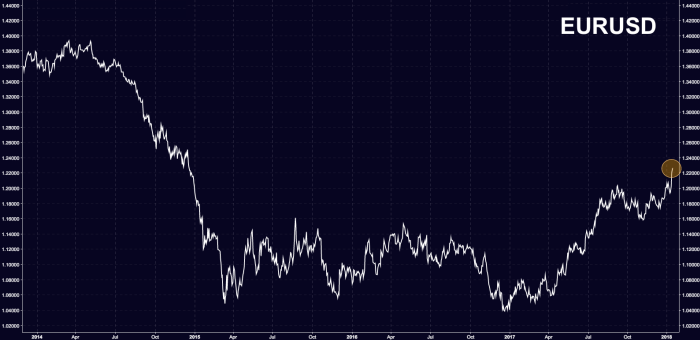Last week, amid “rumors” that China was considering “halting” purchases of U.S. Treasurys, Bloomberg’s Richard Jones and later BofAML suggested the timing seemed awfully convenient.
“The conspiracy theorist in me thinks the timing of this announcement is not accidental, and that the fact that Emmanuel Macron has been in China this week is not a coincidence,” Jones wrote just minutes after the original Bloomberg story hit early Wednesday morning in the U.S.
A couple of hours later, BofAML noted that “the announcement is timely as it coincides with President Macron’s official visit [and] with politics in the Euro Area on a more stable footing, improving macro fundamentals and the end of ECB QE in sight, the EUR as a reserve currency appears to be an increasingly attractive long-term proposition.”
Since then, the euro has of course soared, rising for four consecutive sessions through Monday, helped along first by the China story (which dented the dollar as soon as it crossed), then by the “hawkish” ECB minutes, and finally, by ongoing speculation that Draghi will ultimately choose not to extend APP through December once the current extension (which runs through September) expires. Hawkish rhetoric from Ardo Hansson only served to embolden the euro bulls on Monday. Here’s where things stand:

Well in light of the above, it’s worth noting that earlier today, Bundesbank board member Andreas Dombret told an audience in Hong Kong that Germany will be adding the yuan to its reserves.
“The renminbi is used increasingly as part of central banks’ foreign-exchange reserves — for example, the ECB included the RMB but also other European central banks did so,” he said.
Later, a spokesperson for the Bundesbank told Bloomberg that “the decision for a future investment in Renminbi was made in the summer of 2017.”













Leave A Comment